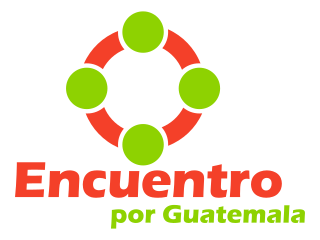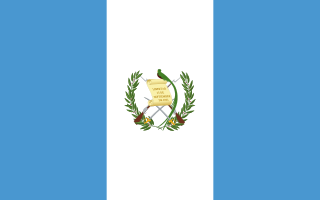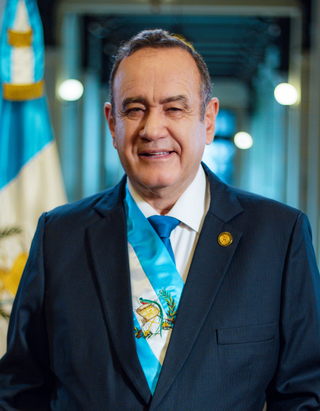
Jorge Briz Abularach (born 27 September 1955) is a Guatemalan politician who served as his country's foreign minister [1] from July 2004 to July 2006 and president of Guatemala's Chamber of Commerce.

Jorge Briz Abularach (born 27 September 1955) is a Guatemalan politician who served as his country's foreign minister [1] from July 2004 to July 2006 and president of Guatemala's Chamber of Commerce.

Central America is a subregion of the Americas. Its political boundaries are defined as bordering Mexico to the north, Colombia to the south, the Caribbean Sea to the east, and the Pacific Ocean to the west. Central America usually consists of seven countries: Belize, Costa Rica, El Salvador, Guatemala, Honduras, Nicaragua, and Panama. Within Central America is the Mesoamerican biodiversity hotspot, which extends from northern Guatemala to central Panama. Due to the presence of several active geologic faults and the Central America Volcanic Arc, there is a high amount of seismic activity in the region, such as volcanic eruptions and earthquakes which has resulted in death, injury, and property damage.

Guatemala City, formally New Guatemala of Assumption and the Ancient, known locally as Guate, is the capital and largest city of Guatemala, and the most populous urban area in Central America. The city is located in the south-central part of the country, nestled in a mountain valley called Valle de la Ermita. The city is also the capital of the Guatemala Department.
The history of Guatemala begins with the Maya civilization, which was among those that flourished in their country. The country's modern history began with the Spanish conquest of Guatemala in 1524. Most of the great Classic-era (250–900 AD) Maya cities of the Petén Basin region, in the northern lowlands, had been abandoned by the year 1000 AD. The states in the Belize central highlands flourished until the 1525 arrival of Spanish conquistador Pedro de Alvarado. Called "The Invader" by the Mayan people, he immediately began subjugating the Indian states.

The Federal Republic of Central America was a sovereign state south of Mexico which existed from 1823 to 1841. Originally known as the United Provinces of Central America, the democratic republic was composed of the territories of the former Captaincy General of Guatemala of New Spain.

José Efraín Ríos Montt was a Guatemalan military officer, politician, and dictator who served as de facto President of Guatemala from 1982 to 1983. His brief tenure as chief executive was one of the bloodiest periods in the long-running Guatemalan Civil War. Ríos Montt's counter-insurgency strategies significantly weakened the Marxist guerrillas organized under the umbrella of the Guatemalan National Revolutionary Unity (URNG), while also leading to accusations of war crimes and genocide perpetrated by the Guatemalan Army under his leadership.

Carlos Manuel Arana Osorio was a military officer and politician who served as president of Guatemala from 1970 to 1974. His government enforced torture, disappearances and killings against political and military adversaries, as well as common criminals.

The Congress of the Republic is the unicameral legislature of the Republic of Guatemala. The Guatemalan Congress is made up of 160 deputies who are elected by direct universal suffrage to serve four-year terms. The electoral system is closed party list proportional representation. 31 of the deputies are elected on a nationwide list, whilst the remaining 127 deputies are elected in 22 multi-member constituencies. Each of Guatemalas's 22 departments serves as a district, with the exception of the department of Guatemala containing the capital, which on account of its size is divided into two (distrito central and distrito Guatemala). Departments are allocated seats based on their population size and they are shown in the table below.

The Captaincy General of Guatemala, also known as the Kingdom of Guatemala, was an administrative division of the Spanish Empire, under the viceroyalty of New Spain in Central America, including the present-day nations of Costa Rica, Nicaragua, Honduras, El Salvador, and Guatemala, and the Mexican state of Chiapas. The governor-captain general was also president of the Royal Audiencia of Guatemala, the superior court.

The Guatemalan Civil War was a civil war in Guatemala fought from 1960 to 1996 between the government of Guatemala and various leftist rebel groups. The government forces have been condemned for committing genocide against the Maya population of Guatemala during the civil war and for widespread human rights violations against civilians. The context of the struggle was based on longstanding issues of unfair land distribution. Wealthy Guatemalans, mainly European-descended, and foreign companies such as the American United Fruit Company had dominated control over much of the land, and paid almost zero taxes in return – leading to conflicts with the rural indigenous poor who worked the land under miserable terms.

The Universidad de San Carlos de Guatemala is the largest and oldest university of Guatemala; it is also the fourth founded in the Americas. Established in the Kingdom of Guatemala during the Spanish colony, it was the only university in Guatemala until 1954, although it continues to hold distinction as the only public university in the entire country.

Otto Fernando Pérez Molina is a Guatemalan politician and retired general, who served as the President of Guatemala from 2012 to 2015. Standing as the Patriotic Party candidate, he lost the 2007 presidential election but prevailed in the 2011 presidential election. During the 1990s, before entering politics, he served as Director of Military Intelligence, Presidential Chief of Staff under President Ramiro de León Carpio, and as chief representative of the military for the Guatemalan Peace Accords. On being elected President, he called for the legalization of drugs.

Encuentro por Guatemala ("EG")– a Spanish name variously translated as "Encounter for Guatemala", or as "Together for Guatemala" (Reuters) – was a Guatemalan political party; encuentro may also translate as "gathering", "meeting", or "union".

There is a U.S. Embassy in Guatemala located in Guatemala City. According to the United States Department of State, relations between the United States and Guatemala have traditionally been close, although sometimes they are tense regarding human, civil, and military rights.

The following outline is provided as an overview of and topical guide to Guatemala:

Guatemala, officially the Republic of Guatemala, is a country in Central America. It is bordered to the north and west by Mexico, to the northeast by Belize, to the east by Honduras, to the southeast by El Salvador. It is touched to the south by the Pacific Ocean and to the northeast by the Gulf of Honduras. With an estimated population of around 17.6 million, Guatemala is the most populous country in Central America and the 11th most populous country in the Americas. It is a representative democracy with its capital and largest city being Nueva Guatemala de la Asunción, also known as Guatemala City, the most populous city in Central America.

The Guatemalan genocide, also referred to as the Maya genocide, or the Silent Holocaust, was the massacre of Maya civilians during the Guatemalan Civil War (1960–1996) by successive US-backed Guatemalan military governments. Massacres, forced disappearances, torture and summary executions of guerrillas and especially civilian collaborators at the hands of security forces had been widespread since 1965, and was a longstanding policy of the military regime, which US officials were aware of. A report from 1984 discussed "the murder of thousands by a military government that maintains its authority by terror". Human Rights Watch has described "extraordinarily cruel" actions by the armed forces, mostly against unarmed civilians.

Movimiento Semilla is a centre-left political party in Guatemala.

Alejandro Eduardo Giammattei Falla is a Guatemalan politician who has been serving as the 51st and current president of Guatemala since 2020.

General elections were held in Guatemala on 25 June 2023 to elect the president and vice president, all 160 seats in Congress, all 20 members of the Central American Parliament, and mayors and councils for all the country's 340 municipalities. Incumbent president Alejandro Giammattei was constitutionally prohibited from running for a second four-year term. However, as no presidential candidate obtained over 50 percent of the vote in the first round on 25 June 2023, a second round was held between the top two finishers on 20 August 2023: Congressman Bernardo Arévalo of the Movimiento Semilla and Sandra Torres, a former first lady representing the National Unity of Hope (UNE) party. Arévalo defeated Torres in the second round with nearly 61 percent of the vote in what was seen as a landslide.